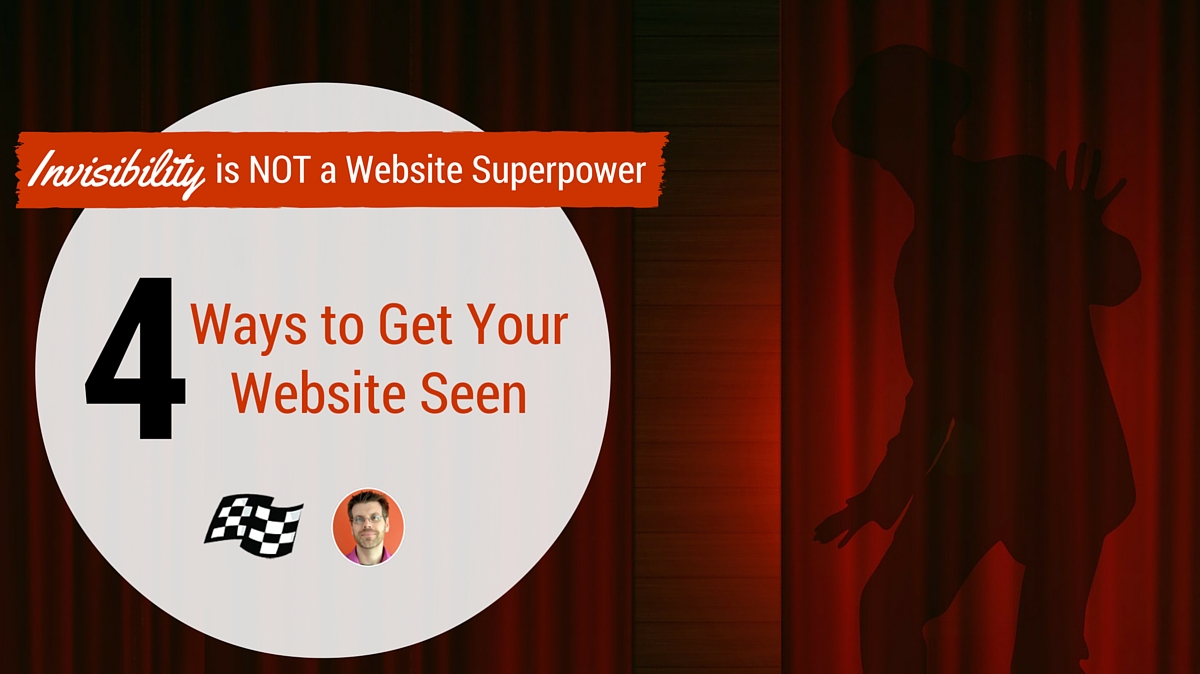
Who doesn’t love a good super hero? How many times in our lives have we thought about which would be the greatest superpower to have (teleportation), and what we would be able to do with it (I’ll be right over to tell you.)
But sometimes some of the coolest super powers aren’t so cool after all. Take invisibility for example. You may think it would be awesome to go wherever you want without being seen, but it didn’t work out so well for this guy:
And, well, that’s kinda what an invisibility super power will do for your website too! Luckily, there’s a cure, and it’s one that turns out far better than the guy in the clip above. Here are 4 ways to make sure your site gets seen:
1. Stabilize Your Site’s Underlying Architecture
The architecture of your site deals with many of the issues that the visitor never sees, but it weighs heavily in how search engines assess, value, and rank your site. In fact, the success of all of your web marketing efforts will depend heavily on the architectural foundation of your site.
Poor architecture affects the ability of the search engines to crawl and index your pages, the speed at which your pages download, whether the engines can read your content, the integrity of your links, and a number of other things.
Any attempts at web marketing will likely come crashing down if you don’t get your site architecture functioning as it should. A lot of this falls on the web developer. However, your marketing team should be able to guide them through areas they aren’t familiar with.
2. Optimize Your Content
A key component to ensuring your site can be found is through keyword optimization of your content, otherwise known as search engine optimization. While search engines are not the only driver of traffic to websites, they still constitute one of the primary ways searchers will find you.
Keyword optimization is the backbone of targeting your audience for the content they need. It’s not about adding keywords to the content so much as understanding what your audience is interested in and creating content that meets that desire.
Publishing optimized content creates a seemingly endless number of doors for your audience to find you through. As long as there are keywords, there is optimization to be done.
3. Invest in Paid Ad Campaigns
For near-instant traffic and efficient ROI measurement, PPC (pay-per-click) marketing takes a backseat to nothing else. But like anything else we do online, effective PPC has to be properly managed in order to be profitable.
Many businesses try and fail at managing their PPC campaigns effectively. But it’s not because it’s impossible to make PPC profitable. It’s that they couldn’t make it profitable. It takes a skilled and knowledgeable hand to both properly set up a PPC campaign and keep it operating at peak performance.
Once set up, your campaign has to be optimized based on the performance data. This is done by adjusting your campaigns and ad groups, testing ad performance, adding/removing keywords, and so on. Even after it becomes profitable, there are always ways to continue to improve the results.
But don’t let that scare you off. PPC is a great way of getting traffic delivered to your website under controlled conditions where profitability and proper budget maintenance are being monitored.
4. Engage in Social Media
Social media is a great way to drive targeted traffic to your website while building brand and name recognition. Unlike SEO and PPC, where traffic is delivered based on what people are searching for today, social media helps you connect with people based on their current long-term interests, and what they may need tomorrow.
When you engage with like-minded people on social media, you may not be able to address their immediate needs, but you are connecting with them based on a common interest. Those connections can become some of your most valuable business assets later.
Social media is where you build trust and reputation with would-be customers. When those connections reach a point where they need what you offer, you’re the expert they go to by default. If they know of someone else who’s looking, they become your brand evangelists, spreading word of mouth and bringing people to your door for you.
Checklist for a More Visible Website
- Get an SEO audit of your site architecture. Take these findings to your web developer and have them fix any serious issues immediately.
- Dig into keyword research. Even if you can’t spend time optimizing every page on your site, you can learn the lingo being used by searchers. Begin to write content around those topics.
- Set up a PPC campaign. This is where I suggest getting an expert involved, for sure. PPC can be easy to run, but it’s not always easy to be profitable.
- Begin engaging on social media. Even if you don’t have a “plan” in place, you can start making connections and begin a non-promotional dialogue with others who have similar interests. This will be the foundation of a more targeted social media campaign later.
